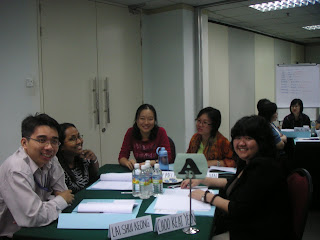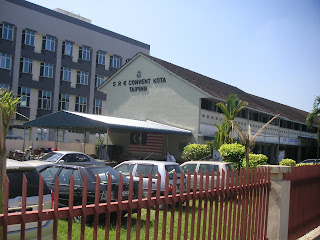









The Chinese Spring Festival is almost over and now we can get back to our normal routine. Like to share these simple stories.
Five (5) lessons to make you think about the way we treat people.
1 - First Important Lesson - Cleaning Lady.
During my second month of college, our professor gave us a pop quiz. I was a conscientious student and had breezed through the ques tions until I read the last one: 'What is the first name of the woman who cleans the school?'Surely this was some kind of joke. I had seen the cleaning woman several times. She was tall, dark-haired and in her 50s, but how would I know her name? I handed in my paper, leaving the last question blank. Just before class ended, one student asked if the last question would count toward our quiz grade. 'Absolutely,' said the professor. 'In your careers, you will meet many people. All are significant. They deserve your attention and care, even if all you do is smile and say 'hello.'I've never forgotten that lesson. I also learned her name was Dorothy.
2. - Second Important Lesson - Pickup in the Rain One night, at 11:3 0 p.m., an older African American woman was standing on the side of an Alabama highway trying to endure a lashing rainstorm. Her car had broken down and she desperately needed a ride.
Soaking wet, she decided to flag down the next car. A young white man stopped to help her, generally unheard of in those conflict-filled 60s.. The man took her to safety, helped her get assistance and put her into a taxicab. She seemed to be in a big hurry, but wrote down his address and thanked him. Seven days went by and a knock came on the man's door. To his surprise, a giant console color TV was delivered to his home. A special note was attached..It read:'Thank you so much for assisting me on the highway the other night. The rain drenched not only my clothes, but also my spirits. Then you came along. Because of you, I was able to make it to my dying husband's bedside just before he passed away... God bless you for helping me and unselfishly serving others.'Sincerely, Mrs. Nat King Cole.
3 - Third Important Lesson - Always remember those who serve. In the days when an ice cream sundae cost much less, a 10-year-old boy entered a hotel coffee shop and sat at a table. A waitress put a glass of water in front of him.'How much is an ice cream sundae?' he asked. 'Fifty cents,' replied the waitress.The little boy pulled is hand out of his pocket and studied the coins in it.'Well, how much is a plain dish of ice cream?' he inquired. By now more people were waiting for a table and the waitress was growing impatient.'Thirty-five cents,' she brusquely replied. The little boy again counted his coins. 'I'll have the plain ice cream,' he said. The waitress brought the ice cream, put the bill on the table and walked away. The boy finished the ice cream, paid the cashier and left. When the waitress came back, she began to cry as she wiped down the table. There, placed neatly beside the empty dish, were two nickels and five pennies.. You see, he couldn't have the sundae, because he had to have enough left to leave her a tip.
4 - Fourth Important Lesson. - The obstacle in Our Path. In ancient times, a King had a boulder placed on a roadway. Then he hid himself and watched to see if anyone would remove the huge rock. Some of the king's wealthiest merchants and courtiers came by and simpl y walked around it. Many loudly blamed the King for not keeping the roads clear, but none did anything about getting the stone out of the way. Then a peasant came along carrying a load of vegetables. Upon approaching the boulder, the peasant laid down his burden and tried to move the stone to the side of the road. After much pushing and straining, he finally succeeded. After the peasant picked up his load of vegetables, he noticed a purse lying in the road where the boulder had been. The purse contained many gold
Then a peasant came along carrying a load of vegetables. Upon approaching the boulder, the peasant laid down his burden and tried to move the stone to the side of the road. After much pushing and straining, he finally succeeded. After the peasant picked up his load of vegetables, he noticed a purse lying in the road where the boulder had been. The purse contained many gold coins and a note from the King indicating that the gold was for the person who removed the boulder from the roadway. The peasant learned what many of us never understand!Every obstacle presents an opportunity to improve our condition.
5 - Fifth Important Lesson - Giving When it Counts...
Many years ago, when I worked as a volunteer at a hospital, I got to know a little girl named Liz who was suffering from a rare & serious disease. Her only chance of recovery appeared to be a blood transfusion from her 5-year old brother, who had miraculously survived the same disease and had developed the antibodies needed to combat the illness. The doctor explained the situation to her little brother, and asked the little boy if he would be willing to give his blood to his sister. I saw him hesitate for only a moment before taking a deep breath and saying, 'Yes I'll do it if it will save her.' As the transfusion progressed, he lay in bed next to his sister and smiled, as we all did, seeing the color returning to her cheek. Then his face grew pale and his smile faded.He looked up at the doctor and asked with a trembling voice, 'Will I start to die right away'. Being young, the little boy had misunderstood the doctor; he thought he was going to have to give his sister all of his blood in order to save her but he had chosen to save her anyway. Now you have 2 choices. I hope that you will choose No. 2 Work like you don't need the money, love like you've never been hurt, and dance like you do when nobody's watching.
Five (5) lessons to make you think about the way we treat people.
1 - First Important Lesson - Cleaning Lady.
During my second month of college, our professor gave us a pop quiz. I was a conscientious student and had breezed through the ques tions until I read the last one: 'What is the first name of the woman who cleans the school?'Surely this was some kind of joke. I had seen the cleaning woman several times. She was tall, dark-haired and in her 50s, but how would I know her name? I handed in my paper, leaving the last question blank. Just before class ended, one student asked if the last question would count toward our quiz grade. 'Absolutely,' said the professor. 'In your careers, you will meet many people. All are significant. They deserve your attention and care, even if all you do is smile and say 'hello.'I've never forgotten that lesson. I also learned her name was Dorothy.
2. - Second Important Lesson - Pickup in the Rain One night, at 11:3 0 p.m., an older African American woman was standing on the side of an Alabama highway trying to endure a lashing rainstorm. Her car had broken down and she desperately needed a ride.
Soaking wet, she decided to flag down the next car. A young white man stopped to help her, generally unheard of in those conflict-filled 60s.. The man took her to safety, helped her get assistance and put her into a taxicab. She seemed to be in a big hurry, but wrote down his address and thanked him. Seven days went by and a knock came on the man's door. To his surprise, a giant console color TV was delivered to his home. A special note was attached..It read:'Thank you so much for assisting me on the highway the other night. The rain drenched not only my clothes, but also my spirits. Then you came along. Because of you, I was able to make it to my dying husband's bedside just before he passed away... God bless you for helping me and unselfishly serving others.'Sincerely, Mrs. Nat King Cole.
3 - Third Important Lesson - Always remember those who serve. In the days when an ice cream sundae cost much less, a 10-year-old boy entered a hotel coffee shop and sat at a table. A waitress put a glass of water in front of him.'How much is an ice cream sundae?' he asked. 'Fifty cents,' replied the waitress.The little boy pulled is hand out of his pocket and studied the coins in it.'Well, how much is a plain dish of ice cream?' he inquired. By now more people were waiting for a table and the waitress was growing impatient.'Thirty-five cents,' she brusquely replied. The little boy again counted his coins. 'I'll have the plain ice cream,' he said. The waitress brought the ice cream, put the bill on the table and walked away. The boy finished the ice cream, paid the cashier and left. When the waitress came back, she began to cry as she wiped down the table. There, placed neatly beside the empty dish, were two nickels and five pennies.. You see, he couldn't have the sundae, because he had to have enough left to leave her a tip.
4 - Fourth Important Lesson. - The obstacle in Our Path. In ancient times, a King had a boulder placed on a roadway. Then he hid himself and watched to see if anyone would remove the huge rock. Some of the king's wealthiest merchants and courtiers came by and simpl y walked around it. Many loudly blamed the King for not keeping the roads clear, but none did anything about getting the stone out of the way. Then a peasant came along carrying a load of vegetables. Upon approaching the boulder, the peasant laid down his burden and tried to move the stone to the side of the road. After much pushing and straining, he finally succeeded. After the peasant picked up his load of vegetables, he noticed a purse lying in the road where the boulder had been. The purse contained many gold
Then a peasant came along carrying a load of vegetables. Upon approaching the boulder, the peasant laid down his burden and tried to move the stone to the side of the road. After much pushing and straining, he finally succeeded. After the peasant picked up his load of vegetables, he noticed a purse lying in the road where the boulder had been. The purse contained many gold coins and a note from the King indicating that the gold was for the person who removed the boulder from the roadway. The peasant learned what many of us never understand!Every obstacle presents an opportunity to improve our condition.
5 - Fifth Important Lesson - Giving When it Counts...
Many years ago, when I worked as a volunteer at a hospital, I got to know a little girl named Liz who was suffering from a rare & serious disease. Her only chance of recovery appeared to be a blood transfusion from her 5-year old brother, who had miraculously survived the same disease and had developed the antibodies needed to combat the illness. The doctor explained the situation to her little brother, and asked the little boy if he would be willing to give his blood to his sister. I saw him hesitate for only a moment before taking a deep breath and saying, 'Yes I'll do it if it will save her.' As the transfusion progressed, he lay in bed next to his sister and smiled, as we all did, seeing the color returning to her cheek. Then his face grew pale and his smile faded.He looked up at the doctor and asked with a trembling voice, 'Will I start to die right away'. Being young, the little boy had misunderstood the doctor; he thought he was going to have to give his sister all of his blood in order to save her but he had chosen to save her anyway. Now you have 2 choices. I hope that you will choose No. 2 Work like you don't need the money, love like you've never been hurt, and dance like you do when nobody's watching.











































